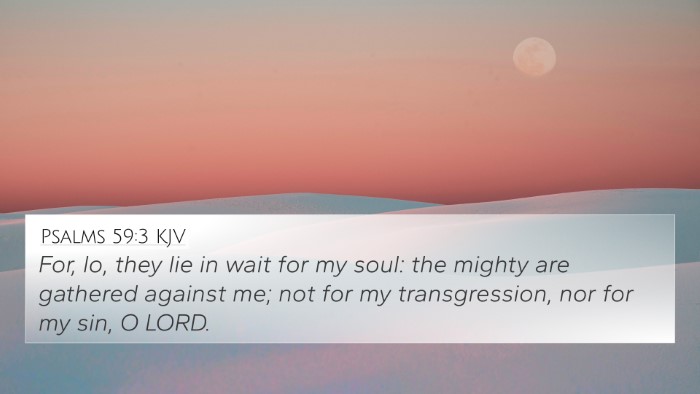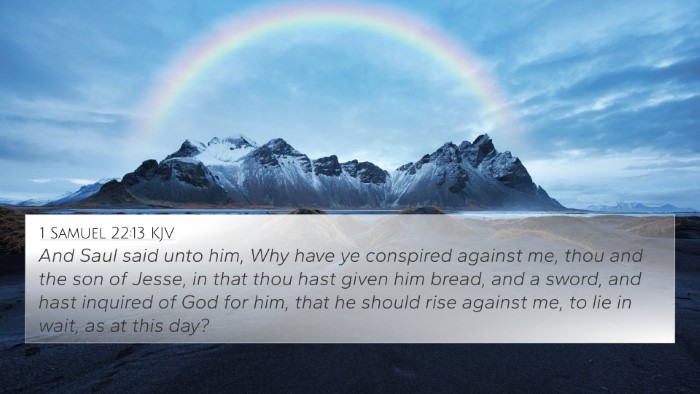Understanding Psalms 7:3
Psalms 7:3 states, "O Lord my God, if I have done this, if there is wrong in my hands." This verse exemplifies a plea for justice and integrity, echoing the themes of self-examination and the pursuit of truth in one's actions. Below, we will summarize insights from notable public domain commentaries and explore the interconnections within Scripture.
Summary of Insights
The petition made by the psalmist suggests an earnest reflection and an appeal to divine justice. Each commentary provides deeper meanings behind this cry for vindication.
- Matthew Henry: Henry emphasizes the importance of self-reflection, encouraging believers to assess their own hearts and actions. This verse represents an earnest appeal to God, asking Him to scrutinize the psalmist’s conduct to ensure he is not guilty of wrongdoing.
- Albert Barnes: Barnes highlights that the psalmist's integrity and innocence are foundational. The verse is interpreted as a challenge to God to reveal the truth regarding any accusations against him, reinforcing God’s role as the ultimate judge.
- Adam Clarke: Clarke elaborates on the idea of seeking vindication from God, showcasing the relationship between inner sincerity and outward actions. The use of “if” suggests a hypothetical situation, inviting a reflective mind on morality and accountability.
Key Themes in Psalms 7:3
- Introspection: The call to examine one's life is central to spiritual growth.
- Divine Justice: Trusting God to reveal truth amid false accusations.
- Integrity: Upholding moral conduct in the face of adversity.
Bible Verse Cross-References
This verse resonates with several scriptural passages that echo similar themes of integrity, justice, and self-examination:
- 2 Samuel 22:24: "I kept myself from my iniquity." - Emphasizes personal responsibility.
- Psalm 26:2: "Examine me, O Lord, and prove me; try my mind and my heart." - A plea for divine scrutiny.
- 1 John 1:9: "If we confess our sins, He is faithful and just to forgive us our sins." - Connects to seeking forgiveness and honesty.
- Psalm 139:23-24: "Search me, O God, and know my heart." - Identifying the need for God’s guidance in self-reflection.
- Job 13:23-24: "How many are mine iniquities and sins? Make me to know my transgression and my sin." - Job’s longing for clarity regarding his sins.
- Romans 2:6: "Who will repay each person according to what they have done." - Speaks to accountability and divine judgment.
- Proverbs 21:2: "Every way of a man is right in his own eyes: but the LORD pondereth the hearts." - A reminder that true evaluation comes from God.
Connections Between Bible Verses
Examining Psalms 7:3 in light of these references helps illustrate the interconnectedness within Scripture:
- Psalms 26:2 deepens the meaning of self-examination as both Psalms 7:3 and 26:2 invite God's examination of the heart.
- Job's cry (Job 13:23-24) parallels the psalmist’s plea, showcasing the universal theme of seeking clarity in times of distress.
- While Romans 2:6 focuses on accountability, it complements the introspection emphasized in Psalms 7:3, enhancing the theological understanding of divine justice.
- The contrasting perspectives in Proverbs 21:2 remind us of the human tendency to rationalize actions, necessitating divine insight as highlighted in Psalms 7:3.
Thematic Bible Verse Connections
Psalms 7:3 can serve as a foundation for exploring various themes in the Bible:
- Justice and Righteousness: The psalmist's inquiry pertains to upholding righteousness before God, which echoes throughout scripture.
- Sin and Redemption: The concept of recognizing one’s sins lays the groundwork for understanding the need for redemption, as seen in 1 John 1:9.
- Personal Accountability: The theme of personal responsibility is reiterated across both the Old and New Testaments, demanding reflection in one's spiritual journey.
Tools for Bible Cross-Referencing
To delve deeper into scriptural connections, various tools and methodologies can be employed:
- Bible Concordance: A useful tool for systematically finding related verses.
- Bible Cross-Reference Guide: Helps in identifying linked themes and teachings.
- Cross-Reference Bible Study Methods: Engaging group studies can lead to richer discussions and insights.
Conclusion
Psalms 7:3 serves as a potent reminder for believers to pursue integrity, engage in self-examination, and trust in God's ultimate justice. By utilizing Bible cross-references and understanding thematic connections, individuals can deepen their study and appreciation of Scripture.














